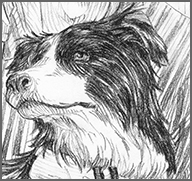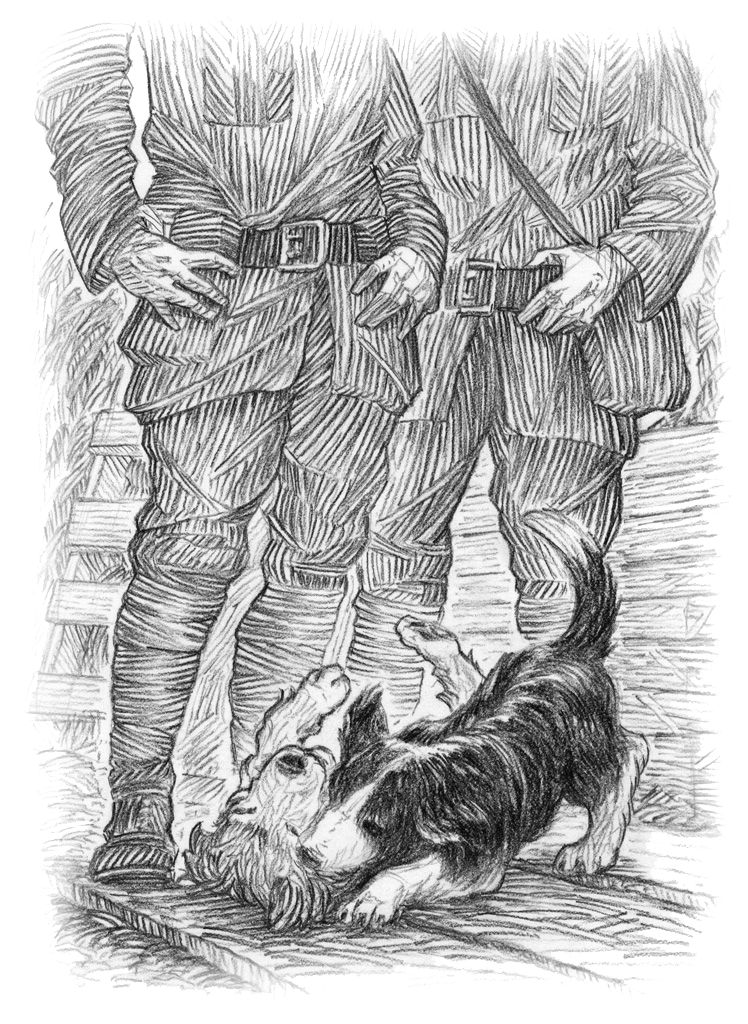
CHAPTER 9
“Begone”
June 2, 1917
For a week, we’d been waiting at headquarters—drilling for the day when we would be in service. We were assigned to the 3rd Battalion Worcestershire, B Company. Twice we had been sent to the Front, but we hadn’t been called into action on either trip.
Tweed, however, had seen plenty of action during her mission. Private Reeves gave glowing accounts of how she had bravely led the orderlies to the wounded. I could sense Tweed’s new confidence. Still, when she’d returned to the kennel, she’d slept as if exhausted. Even a filled dinner bowl wouldn’t rouse her.
When we were called to the Front again, Sergeant Hanson accompanied us. He was in charge of our group of six dogs and handlers. As we made our way down a muddy trench, a small brown dog hurtled past me. He dove beneath a crate of ammunition and I heard the snap of his jaws. The noise startled me. Rags had killed rats with a snap just like that.
The dog emerged, his prey hanging limp from his mouth. I let out a yelp of joy. It was Rags!
Instantly, he dropped the dead rat and sprang on top of me. Wrestling and chewing, we greeted each other while Sergeant Hanson and Private Kent stared in wonder.
“Why, she knows that mutt!” Private Kent said.
“That’s our mascot,” one of the soldiers in B Company said.
Several of his buddies gathered round. “Private Rags,” another man added.

“Keeps this place clean of mice and rats.”
One of them pointed to lines scratched in the dirt wall. “Sure enough, ’e’s up to a hundred.”
“Best soldier in our company. Came from the Battersea Dogs Home.”
“Now he’s got a home with us.”
Rags left me and ran from soldier to soldier. Each man patted and praised him. I wiggled with delight. Now I could stop worrying about my friend. He finally had a family.
“Time to say your farewells now, Darling,” Private Kent said. “Come.”
Rags and I tussled one last time. Picking up the rat, he held it proudly in his mouth. That was the picture I kept in my mind as I trotted down the trench again. Rags had his job in the army, and so did I.
Once we were at the jumping-off point, we met Lieutenant Hudson, commander of the new company. He gave everyone their orders. “Our target is the German communication line we call Nutmeg Avenue and a supply line named Nutmeg Support. Wire cutters have been sent ahead. When it’s dark, we’ll go over the parapet and lay down in the open. We’ll listen for the British artillery to let loose, and then we’ll dash forward and bomb the lines.”
Again Private Kent and I waited in a dugout with the men from the medical corp. He checked his equipment, then refolded the bandages in my saddlebags. An orderly heated water from his canteen to make tea. A stretcher bearer wrote something on the back of sardine tin label. “Want to hear my poem?” he asked when he was finished.
No one replied, but he read it aloud anyway.
Thirty days the earth was blasted,
and the British Tommies fell.
Thirty nights we dared not rest.
We waited for the shell
that signaled our comrades’ deaths.
“Don’t rhyme proper,” the orderly said.
“‘Fell’ and ‘shell’ do,” the stretcher bearer protested.
“Where’s mention of the bloody rations?” the other stretcher bearer complained. “If I eat one more tin of cold bully beef, I’ll mutiny.”
“I thought your poem were right powerful,” Private Kent said solemnly.
“Thank you, mate.” Folding the paper, the stretcher bearer slipped it in his pocket. “If I die, you can send it to the Wipers Times.”
“The Wipers Times?” Private Kent asked.
“You haven’t heard of our trench magazine?” The orderly pulled another folded paper from his pocket. “Named after the town of Ypres, which us stupid Brits call Wipers ’cause we can’t pronounce the Belgian name. The mag’s filled with good old English humor.” He opened the magazine. “Listen to today’s weather report. ‘From five to one—mist. From eleven to two—east wind. From eight to one—chlorine gas.’”
Laughter rose in the small earthen room, and as the orderly continued to read aloud, I dozed, comforted by the cheerful voices.
At dark, Sergeant Hanson roused us. We hurried up the steps from the dugout to the trench. Sensing the tension when we emerged, I stayed close by Private Kent’s side.
Lieutenant Hudson was inspecting his men, who stood tall and ready despite their weary stares and dirt-streaked uniforms. I scanned their faces. Some were as young as the German soldiers who had been taken prisoner. Others looked as if they’d been fighting forever.
“It’s time,” the lieutenant finally said. “Let’s mop them up.” With that, Company B streamed over the top.
Private Kent and I, Private Reeves and Tweed, and a messenger dog and his handler stayed behind. Sergeant Hanson went with Company B and the remaining handlers and dogs.
Almost immediately, a barrage of heavy British artillery split the air. “Right on schedule,” Private Kent said. “Company B should be nearing its target.” I pictured the soldiers running forward in the dark. The Germans firing blindly. Soldiers on both sides falling.
The whine of an incoming shell made me cringe.
“Gas!” The sentries’ warning cries rang up and down the trench. Private Kent didn’t need to hear the word twice. He yanked his mask over his head, then reached in his canvas bag for mine. Quickly, he buckled it on me. I hated that mask. I could barely see out and it pinched my muzzle. But when I saw a soldier clutch his throat because he had been too slow to obey the warning, I was glad Private Kent had reacted swiftly.
Bombs continued to rend the air. Suddenly a horrendous boom crashed near us. Above and beyond the trench, earth rose in the air as high as Portsdown Hill.
“The Huns are blowing up the howitzer battery!” someone hollered. Private Kent covered me with his body as dirt and metal rained over us. When he straightened, there was blood on his cheek. I nuzzled my head against him. “Just a nick, lass,” he assured me.
Finally a breeze carried the gas fumes away, and the sentries’ all-clear cry ran up and down the trench. Slowly, men began to take off their masks. Private Kent unbuckled mine but kept it ready by his side. Only one soldier seemed sick; an orderly quickly led him away.
Flares rose from the German front, lighting the dark. “They know something’s up,” Private Kent whispered. Minutes later, the shrieks of incoming shells and the thuds of bombs hitting the ground reached my ears. The earth shook. Again, I heard the rapid fire of a machine gun. I was used to these sounds, but this time they seemed closer. My heart beat faster and I huddled closer to Private Kent.
As silently as they had left, B Company returned with twelve prisoners. I spotted Sergeant Hanson and Private Carlton, who supported a limping British soldier between them. Blood stained the leg of the man’s trouser. Beast trailed behind.
I hopped up and greeted them with wagging tail. Sergeant Hanson leaned down and held me for a second. His face was grave. “Soon it’ll be your turn to prove yourself, Darling,” he said.
“We cleared the walking wounded,” Lieutenant Hudson told the medical corps. “But without torches to light the way, we had to leave behind those too injured to call out. It’s up to you and the dogs to find them.”
All eyes turned to Tweed and me.
For a brief moment, terror rippled down my spine. Then I spun toward the ladder—this was what I had been trained for.
Without hesitation, Private Kent and Sergeant Hanson lifted me to the top of the parapet. “Begone,” Sergeant Hanson said, a tremor in his voice that only I could hear.
Then Private Kent unsnapped my leash, and I raced into the black night.
A flare ripped through the sky and for an instant I could see the ghostly stretch of land before me. It was riddled with holes and heaped with stones, earth, and shrapnel.
I ran, slowing when I saw the glint of wire. We’d been taught to leap over, crawl under, or go around the sharp barbs that caught fur and tore skin.
Spotting a dark shape draped over the wire, I belly-crawled to it. When I pressed my nose against a hand, there was no sign of life. Quickly, I found a break in the coils made by the wire cutters and moved on. I was in no man’s land.
I lifted my head and sniffed the air. Among the smells of spent artillery and disturbed earth, I detected a different scent. There…to my right. My eyesight was keen, but the shadows made by the looming mounds and twisted trunks confused me. Airplane engines roared overhead. Gunfire strafed the ground in the direction of our front line. The Germans were fighting back.
There was no time to lose. My senses told me there was a wounded soldier nearby, trapped in no man’s land, and I had to find him.